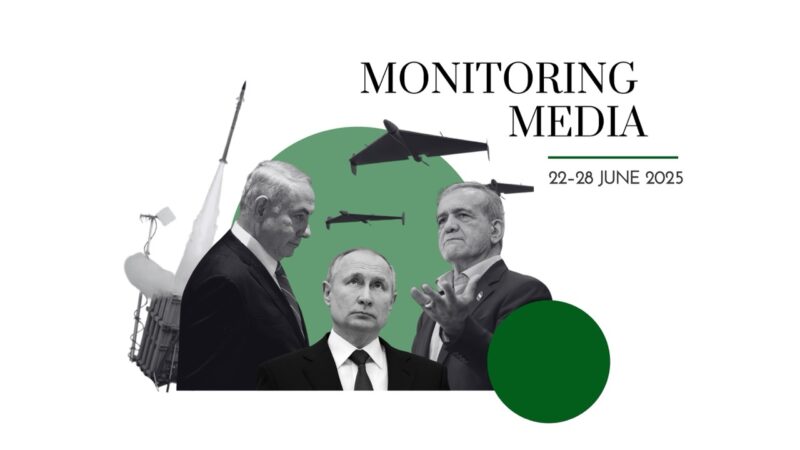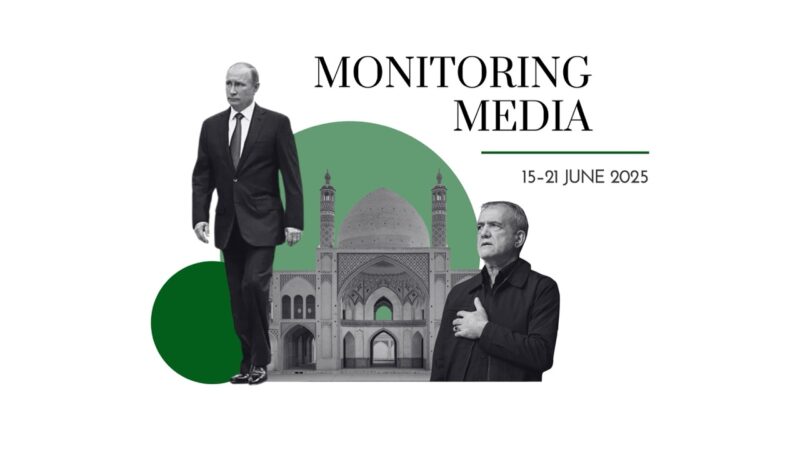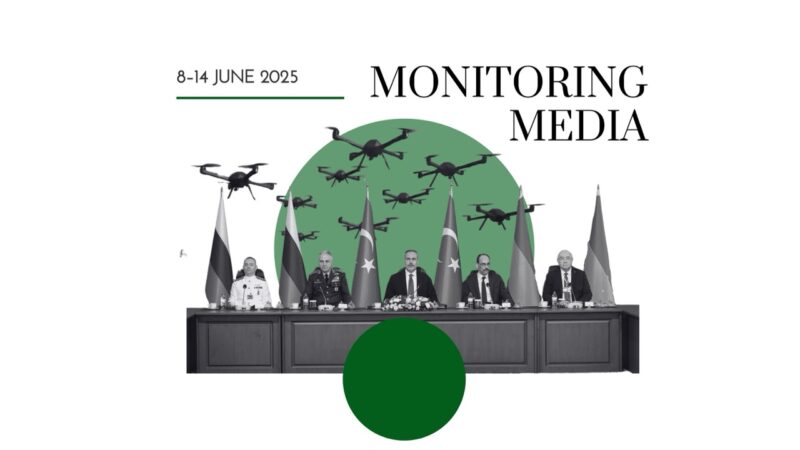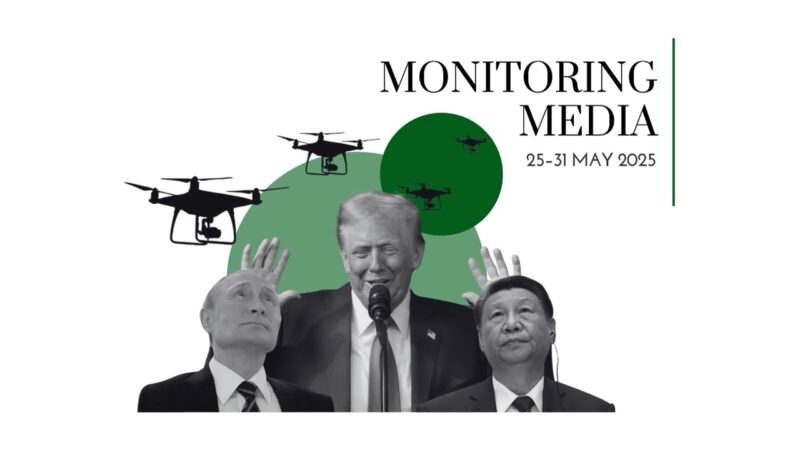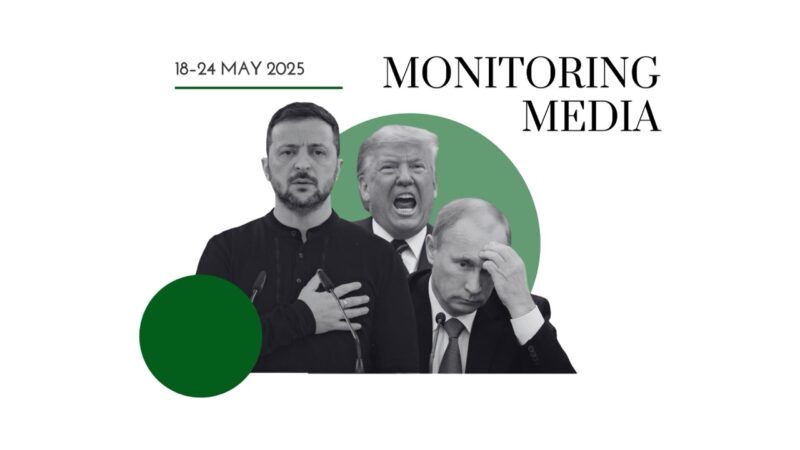Ukraine winning the war also means preserving its very identity and civil society

CIUS weekly report on media coverage of Ukrainian affairs, 29 October–4 November 2022
Three publications (The Conversation, The National Review, and The New Yorker) were selected to prepare this report on how the situation in Ukraine has been portrayed in the press during the past week (29 October–04 November 2022). The sample was compiled based on their impact on public opinion as well as on their professional reputation, popularity among the readership, and topical relevance. These three publications represent centrist, liberal, and conservative viewpoints on the political spectrum.
This report covers only the most-read and relevant articles about Ukraine, as ranked by the respective publications themselves in the past week. Its scope covers promoted articles on home pages and articles from special sections on Ukraine, with the hashtag #Ukraine, from the paper editions of the publications, and about Ukraine from opinion columns and editorials.
Topics featured in the selected articles:
- Ukraine’s current affairs: Zelensky’s wartime addresses set a benchmark for contemporary public speaking; Ukraine’s Nobel prize winner sees peace for her country only after the Russians leave; many of Ukraine’s war migrants in Europe are unlikely to return after the war;
- The world and Ukraine: some voices in the US Democratic party are calling for negotiations with the Kremlin when the time is right;
- Russia at war: Putin’s “fundamentalist mindset” justifies striking Ukraine with tactical nukes; Russia’s strategy of besieging and destroying Ukrainian cities are unlikely to help it win; the Kremlin exploits the Black Sea grain initiative for its military purposes; defeat in the war could fracture Russia into new independent states.
The most common arguments:
President Zelensky has become one of the brightest orators of the contemporary era. Jessica Genauer (The Conversation) analyzes the public speeches of President Zelensky and tries to understand what makes them so captivating and, thus, impactful. Firstly, while delivering them Zelensky appears as an ordinary person speaking about hard times for his country. He structures his texts to be easily comprehensible, appeals to basic human values, and conveys warm emotions to the listener. Secondly, Zelensky’s speeches are skilfully adjusted to their audiences: in the US Congress he compared the Russian invasion to the traumatic experiences of 9/11 and the attack on Pearl Harbour in 1941; in the Finnish Parliament he spoke about atrocities that the Soviets committed during their invasion in 1939; in the Australian Parliament he underscored the bitterness of the MH17 tragedy and praised maritime freedom of navigation. Thirdly, Zelensky portrays Ukraine as a champion of liberty, life, and creation that stands against a tyrannic, deathly, and destructive foe. This contrast makes the war, and Ukraine’s perspective on it, universally appealing. Genauer concludes that “Zelensky’s capacity to make meaning out of a seemingly meaningless situation, to evoke national stories, to weave a narrative that is bigger than any one life or any one nation, has shaped the way in which people around the world have experienced and understood this war.” Genauer also mentions that 16 of Zelensky’s recent wartime speeches, selected by the author himself, will appear in the book A Message From Ukraine.
Ukraine’s Nobel prize winner argues that peace and freedom will come only after the Russians leave her state. Jay Nordlinger (The National Review) discusses the idea behind the Nobel Peace Prize and underscores that it has a strong connection to freedom; it has often been awarded to freedom fighters, supporters of uncensored media, and partisans of political liberty. In 2022, the Nobel committee decided to award one individual (Ales Bialiatski, a Belarusian dissident) and two organizations (“Memorial” from Russia and the Center for Civil Liberties from Ukraine). According to the committee, this year’s winners had for “many years promoted the right to criticize power and protect the fundamental rights of citizens [as well as] made an outstanding effort to document war crimes, human right abuses, and the abuse of power.” Nordlinger briefly introduces the background of all 2022 winners and interviews Oleksandra Matviichuk, executive director of the Center for Civil Liberties. In her answers, first Matviichuk emphasizes that the Russo-Ukrainian war “is not a war between two states but between two systems: authoritarianism and democracy” and that “Putin is afraid of the idea of freedom.” Second, the war had erupted already in 2014, and since then Matviichuk has been documenting war crimes on the occupied territories and recording interviews with victims. Third, the Ukrainian army is fighting for freedom in its broadest sense and for the people in its occupied territories, specifically as “it would be inhuman to leave them in this gray zone without any protection.” Fourth, US support remains crucial for Ukraine’s cause, which aims to liberate people from the implacable, destructive, and intolerant Russian system of occupation.
Massive population displacement provoked by the war poses a future existential challenge for Ukraine. Michael Ben-Gad (The Conversation) scrutinizes the impact of out-migration from Ukraine on the state’s postwar demography and economic prosperity. Ben-Gad claims that the number of Ukrainians currently residing beyond the border of their state is approaching 8 million. Considering the pre-war population of around 37.3 million (excluding occupied Donbas and Crimea), the number of Ukrainians in emigration is very high. These Ukrainians are predominantly women and children, who are trying to find themselves in the new environment of the EU hosting states. Ben-Gad believes that the longer the war lasts the smaller the chance that Ukrainians will return home; instead, having gained employment and education in their host states, they will likely decide to settle and invite remaining members of their families there. In the postwar reality, the massive loss of population will pose a fundamental challenge for Ukraine’s government in its efforts to mitigate economic problems and raise revenues. At the same time, current Russian strategy that is forcing people to flee by purposefully destroying civilian infrastructure will make it harder for Ukrainians to return home and easier for Putin or his successor to conquer the abandoned lands. Ben-Gad remarks that Poland, regardless of the complicated history of relations with its eastern neighbour, became Europe’s most welcoming place for Ukrainians. Ben-Gad concludes that “Ukraine will need more assistance—not just weapons and ammunition but economic assistance—to keep the civilian population from having to leave…Should the war end tomorrow, the World Bank estimates that reconstruction of Ukraine may cost US$349 billion…When the war ends, Ukraine’s next struggle—to lure its people back home—will begin.”
US progressives are staunch in their support of Ukraine but arguing for active diplomacy when the time is right. Isaac Chotiner (The New Yorker) interviews Matt Duss, formerly the chief foreign policy adviser to Senator Bernie Sanders, on present US foreign policy issues regarding Ukraine, and specifically on the policy vision of the progressive wing of the Democratic party. In his answers, Duss shares a few crucial highlights. Primarily, “there is this broad consensus [within the Democratic party] that at some point [the Russo-Ukrainian war] is going to end through some kind of negotiated agreement. The discord is about when that will be and when the United States should up the tempo of those diplomatic efforts.” Secondly, the mainstream policy line today entails in supporting Ukrainians, so that they continue gaining success on the battlefield, and strengthening their negotiation position vis-á-vis Russia. Thirdly, when the time comes the government in Kyiv should strive to align its policies with those of the US: “In the same way that the United States is bringing its superior military and intelligence capabilities to bear on behalf of Ukraine, I think it is right to support the United States bringing its superior diplomatic capabilities to bear on behalf of Ukraine.” Fourthly, by authorizing the invasion Putin made a leadership mistake; he “has shown himself to be a much more reckless and grandiose, and frankly isolated, character.” Fifthly, the enlargement of NATO in the post-Communist space is a weak justification for the Kremlin to launch its invasion: “It is kind of wild to me that amid the deluge of information that we’ve gotten about what Putin wants and what he’s trying to achieve, and why he’s trying to achieve it, people seem to continue to try and shelter under this cocktail umbrella that’s marked ‘nato expansion.’”
Putin’s apparent readiness to deploy nuclear weapons possibly stems from an idiosyncratic rationale. Masha Gessen (The New Yorker) opens her article with a paradox: “The more the Kremlin has signalled its readiness to drop a nuclear bomb, the more the rest of the world has sought a reason to believe that it will not.” Since 2014, according to Gessen, nuclear rhetoric has been on the rise in Russia. The rhetoric became openly hostile after Ukraine launched its counteroffensive in August and surged in the recent calls by the Russian defence minister to European leaders about the “dirty” radioactive bomb that Ukraine was allegedly threatening to detonate. The Western scepticism regarding the Russian nuclear blackmail tends to “rely on arguments that fall into three categories: Putin fears the consequences of a nuclear strike; Putin is unwilling to put Russian citizens at risk; and a nuclear strike will not help accomplish Putin’s strategic goals.” While these arguments sound rational to Western observers, they may not be equally so for Putin, who likely follows his own understanding of rationality, as demonstrated even by the sole fact of authorizing the invasion. Gessen argues that to understand the world inside Putin’s head, one should listen to the president’s own statements as well as to Russian propaganda and the voices of Russian defectors. Having examined all these three sources, Gessen argues that Putin “believes that, on the one hand, he is facing down an existential threat to Russia [in case Ukraine wins] and, on the other, that Western nations don’t have the strength of their convictions to retaliate if it comes to nukes.” To this, one should add Putin’s paranoid outlook and a unilaterally assumed mission to act “on behalf of” the “oppressed” non-Western world and propagate its “traditional” values; Gessen writes of Putin’s mindset as of a fundamentalist that can justify any atrocity. Gessen concludes that “the arguments that Putin won’t use nuclear weapons because doing so would endanger Russians, including himself, are blind to the fact that Putin believes he has the right, possibly the moral obligation, to sacrifice hundreds of thousands or millions of people. The argument that a nuclear strike wouldn’t help Putin achieve his strategic goals mistakes Russia’s strategic goals as anything but inflicting terror on Ukrainians. The losses the Russian military is suffering now can only motivate Putin to create more terror, against more people.”
Russia targeting Ukraine’s cities will only make Ukrainians fight harder. Tim Luckhurst (The Conversation) writes that the ruthless strategy of bombardment launched by Russian general Sergey Surovikin a month ago aims to “destroy civilian morale and cripple the Ukrainian will to resist.” A successful model for this strategy can be found in the Russian war crimes in Syria in 2016, particularly the bombardments of civil infrastructure and hospitals in the city of Aleppo. However, unlike in Ukraine’s case, the air attacks on Aleppo were “backed by Syrian regime forces on the ground.” Thus, the absence of infantry support may lead to exactly the opposite outcomes to those expected by the Russian command. Luckhurst compares the ongoing Russian bombardments of Ukraine to the Nazi bombardments of the UK in the 1940s and highlights that “Germany’s bombing did not destroy Britain’s morale. It caused death, suffering, and acute misery but the most common reaction was captured in Hilde Marchant’s report that ‘The whole [destroyed by air raids city] of Coventry cries: BOMB BACK AND BOMB HARD.’” The German civilians, bombarded by the Allied forces in retaliation, also did not encourage their government to seek compromises with the adversary. Luckhurst concludes that with no major territorial gains, Surovikin’s strategy speaks more to Russia’s desperation than to dispassionate planning.
Russia’s strategy of besieging Ukraine appears futile. Robert M. Dover (The Conversation) argues that to gain new ground, the Russians need to reinvent the rules of the siege for the war they are waging. According to the standard definition, a siege entails “surrounding and attacking a fortified place in such a way as to isolate it from help and supplies.” The Kremlin tried imposing classical sieges early on in the escalated phase of this war, in Mariupol and Kharkiv. However, these sieges came at a great cost to the invaders and were neither universally successful nor detrimental to Ukraine’s willingness to fight. Today, if Russia wants to change the tide in its favour, it would need to besiege the whole of Ukraine and cut it off from Western supplies. This objective is almost impossible to achieve, considering the sheer size of Ukraine and the manpower limitations of the Russian army. Therefore, the Kremlin decided to destroy civilian infrastructure, with the help of Iranian drones, depriving Ukraine’s citizens of electricity, water, central heating, and other public utilities. At the same time, the Kremlin expects to magnify Western financial concerns about the growing expenses needed for Ukraine’s reconstruction. Concluding his article, Dover paraphrases the words of Tim Luckhurst and writes that “attacks on the Ukrainian population aim to undermine their confidence in their government and to diminish their desire, or ability, to resist the Russian military[; however,] the Russian military—even with Iranian help—does not currently possess enough weaponry to break the will of the Ukrainians.” The new siege strategy, aimed at depriving Ukrainians of their vital necessities and scaring off the West, seems to be failing.
Kremlin tries to exploit the Black Sea grain initiative to its military advantage. Stefan Wolff (The Conversation) writes that in response to Ukraine’s most recent attack on the Russian Black Sea fleet stationed in Sevastopol, the Kremlin declared its withdrawal from the Black Sea grain initiative. It was brokered by the UN and Turkey in July 2022 in order to allow grain exports from Ukraine to low-income countries through a navigation-safe humanitarian corridor. By withdrawing from the initiative, Russia transformed the corridor from a neutral zone into a potential battle theatre, putting in jeopardy 200 merchant vessels which had been employed in shipping Ukraine’s agricultural products; it also provoked global price increases for wheat and corn of up to 6 per cent in one day. Wolff suggests that through its pressure on Ukraine’s grain exports Russia aims to fulfill at least two military objectives: first, to shift responsibility for the deteriorating global food crisis onto Ukraine—which, according to the Kremlin, is using a humanitarian corridor to arm itself and attack Russia’s fleet; second, to force Kyiv into negotiations and legitimize Russia’s land grab, or at least stabilize the front line in light of Ukraine’s counteroffensive. Wolff concludes that Russia’s withdrawal from its participation in the Black Sea grain initiative is “a reckless and cowardly move by the Kremlin that puts the lives of potentially tens of millions of people on the line who are not simply pawns in an increasingly desperate game of brinkmanship.”
Future partition of Russia is unlikely but should not be discounted. Matthew Sussex (The Conversation) raises the question of whether the partition of the Russian Federation into smaller sovereign entities is possible following its defeat in the ongoing war. Although there are no such indications today, Sussex argues that “there are three good reasons…that defeat in Ukraine might make the Kremlin’s edifice crumble, leaving Russia difficult to govern in its entirety, or at least its present form.” For one thing, the partition of Moscow-centred empires has happened before, as was the case with the USSR, a partition that came unexpectedly and unpredictably. Secondly, Russia’s regime lacks flexibility, as it is very Putin-dependent. Whoever attempts to replace Putin as the pivotal political figure will likely fail to find a balance between all stakeholders and therefore will deepen frictions between the biggest clans and their interests. Thirdly, “the war has exacerbated cracks between the privileged Russian political core and its [racial-ethnic minority-dominant] periphery.” Serving as cannon fodder and suffering major human casualties in the war, the representatives of Russia’s poorest ethnic groups will eventually gain the courage and reason to speak against the Kremlin’s imperial projects, recognizing its rule as illegitimate. Sussex argues that the moment Putin loses his grip or reputation, likely the first to rise against the Kremlin will be the North Caucasus region, governed by the outspoken Chechen strongman Ramzan Kadyrov. Sussex concludes that “when authoritarian regimes implode, they tend to do so very quickly, and with little warning.” Therefore, the world should develop a plan to deal with “a variety of nuclear-armed aspirant statelets” that may or may not emerge following the Russian Federation’s potential partition.
